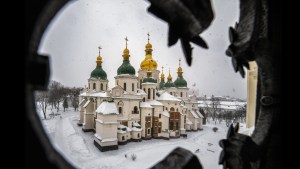In this series

Stylized religious paintings, such as this one of Christ, are still a significant part of the Eastern Orthodox faith that Prince Vladimir adopted as his kingdom’s official religion c. 988. They are numerous in modern Orthodox Churches. But to the Orthodox they are far more than mere paintings.
In their eyes, icons are a ministry, to the heart as much as to the eyes. They not only see them as works of beauty, and thus carefully preserve and venerate them; they also see the beauty of the icons as turning the believer’s thoughts to the beauty of God. Additionally, they view them as teaching tools and reminders, providing believers with visual aids to help them learn and remember biblical and church history events, as well as the characters and their virtues.
Iconography is definitely not a free-form genre that allows the artists to paint their subjects any way they will. Rather, icons are produced according to strict, widely held standards, by artists who must train for years, learning meticulously the established parameters of what icons can look like. And the painting must be preceded by times of fasting and prayer in preparation for this spiritual work. For more on icons, see the article in this issue, “What is Orthodoxy Anyway?”
Copyright © 1988 by the author or Christianity Today/Christian History magazine. Click here for reprint information on Christian History.





